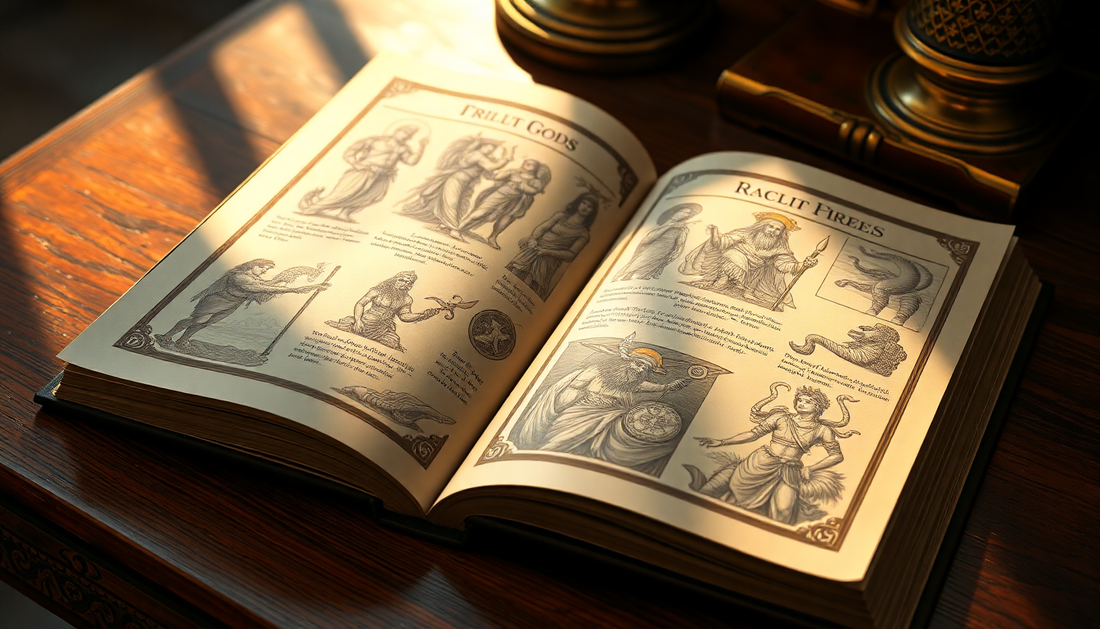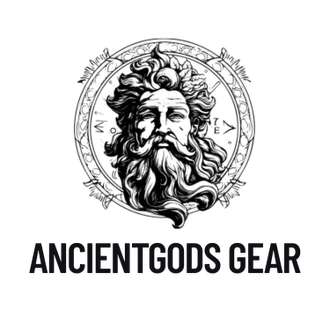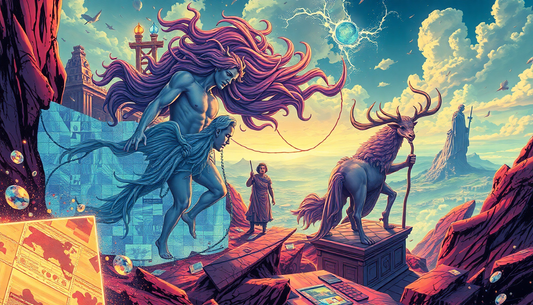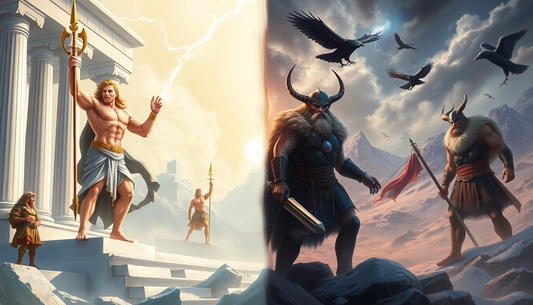
The Most Powerful Gods in Ancient Mythology
In the vast tapestry of human history, few subjects have captivated the imagination of scholars and enthusiasts alike as the pantheon of ancient gods. From the towering figures of Greek and Roman mythology to the enigmatic deities of Egyptian, Norse, and Mesopotamian civilizations, these divine beings have left an indelible mark on our collective consciousness.
At AncientGods Gear, we are dedicated to exploring the rich and diverse world of ancient mythology, unearthing the stories, symbols, and legacies of these powerful entities. In this comprehensive guide, we will delve into the most influential and awe-inspiring gods from across the ancient world, shedding light on their unique attributes, domains, and the enduring impact they have had on human culture.
The Olympian Gods: Rulers of the Greek Pantheon
The Greek pantheon, with its intricate web of familial relationships and complex power dynamics, stands as one of the most well-known and extensively studied ancient belief systems. At the heart of this pantheon are the Olympian gods, a group of twelve deities who reigned supreme over the mortal and divine realms.
Zeus: The King of the Gods
As the ruler of the Olympian gods, Zeus was the embodiment of power, authority, and divine justice. Wielding the mighty thunderbolt, he was the god of the sky, weather, law, order, and fate, commanding respect and fear from both mortals and his fellow deities. Zeus's domain extended far beyond the realm of the heavens, as he was also revered as the protector of cities, the patron of hospitality, and the arbiter of oaths and treaties.
Hera: The Queen of the Gods
Hera, the sister and wife of Zeus, was the goddess of marriage, women, and family. Known for her fierce loyalty and unwavering determination, she was often depicted as a powerful and formidable figure, capable of both nurturing and punishing those who crossed her. Hera's domain encompassed the sanctity of marriage, the protection of women, and the preservation of the social order.
Poseidon: The Ruler of the Seas
As the god of the seas, Poseidon was a force to be reckoned with. Wielding a mighty trident, he was the master of the oceans, controlling the tides, storms, and all maritime activities. Poseidon's domain extended beyond the seas, as he was also revered as the god of earthquakes, horses, and the creation of new lands. His tempestuous nature and unpredictable moods made him a complex and often feared deity.
Athena: The Goddess of Wisdom and War
Athena, the goddess of wisdom, strategy, and warfare, was a multifaceted deity who embodied the ideals of intelligence, courage, and justice. As the patron of Athens, she was revered as the protector of the city, guiding its people in times of conflict and inspiring them to pursue knowledge and excellence. Athena's domain encompassed not only the art of war but also the realms of craftsmanship, weaving, and the pursuit of higher learning.
Apollo: The God of the Sun, Music, and Prophecy
As the god of the sun, music, poetry, and prophecy, Apollo was a central figure in the Greek pantheon. His domain extended to the realms of healing, archery, and the arts, making him a highly influential and revered deity. Apollo's oracle at Delphi was a renowned center of divination, where mortals sought guidance and wisdom from the god himself.
These are just a few of the powerful Olympian gods that have captivated the imagination of scholars and enthusiasts alike. Each deity possessed a unique set of attributes, domains, and mythological narratives that contributed to the rich tapestry of Greek mythology.
The Enigmatic Deities of Ancient Egypt
While the Greek pantheon is undoubtedly one of the most well-known ancient belief systems, the gods of ancient Egypt hold a special place in the hearts and minds of those fascinated by the mysteries of the ancient world. These enigmatic deities, with their intricate symbolism and complex mythological narratives, have left an indelible mark on human history.
Ra: The Sun God
As the supreme deity of the ancient Egyptian pantheon, Ra was the god of the sun, creation, and rebirth. Depicted with the head of a falcon and a solar disk atop his head, Ra was revered as the source of all life, responsible for the daily cycle of the sun and the annual flooding of the Nile, which sustained the agricultural prosperity of the region.
Anubis: The Guardian of the Dead
Anubis, the jackal-headed god, was the patron of the dead and the embalming process. As the gatekeeper to the afterlife, Anubis was responsible for guiding the souls of the deceased through the treacherous journey to the underworld, ensuring a safe passage to the realm of the dead.
Isis: The Goddess of Magic and Motherhood
Isis, the goddess of magic, fertility, and motherhood, was one of the most revered deities in the ancient Egyptian pantheon. Depicted as a woman with the wings of a falcon or a throne upon her head, Isis was the embodiment of the nurturing and protective aspects of the divine feminine, offering solace and guidance to both the living and the dead.
Osiris: The Lord of the Underworld
Osiris, the god of the underworld, was a central figure in the ancient Egyptian belief system. As the ruler of the realm of the dead, Osiris was responsible for judging the souls of the deceased and ensuring their safe passage to the afterlife. His mythological narrative, which involved his murder, resurrection, and subsequent reign as the lord of the underworld, has captivated the imagination of scholars and enthusiasts alike.
Bastet: The Goddess of Cats and Protection
Bastet, the cat-headed goddess, was the patron of cats, fertility, and protection. Revered for her gentle and nurturing nature, Bastet was believed to offer safeguard against evil spirits and diseases, making her a beloved deity among the ancient Egyptians.
These are just a few of the powerful and enigmatic deities that were central to the ancient Egyptian belief system. Each god and goddess possessed a unique set of attributes, symbols, and mythological narratives that contributed to the rich tapestry of this ancient civilization.
The Pantheon of the Norse Gods
The gods of Norse mythology, with their epic tales of heroism, betrayal, and the impending doom of Ragnarök, have captured the imagination of people around the world. These deities, rooted in the beliefs and traditions of the ancient Scandinavian and Germanic peoples, offer a unique and captivating perspective on the divine.
Odin: The All-Father
As the ruler of the Norse pantheon, Odin was the god of wisdom, war, and death. Depicted as a one-eyed, bearded figure adorned with a wide-brimmed hat, Odin was revered for his vast knowledge, his cunning in battle, and his ability to communicate with the dead. His domain extended beyond the realms of warfare and strategy, as he was also the patron of poetry, magic, and the pursuit of knowledge.
Thor: The God of Thunder
Thor, the god of thunder, was one of the most beloved and iconic deities in the Norse pantheon. Wielding the mighty hammer Mjolnir, Thor was the protector of both the gods and mortals, using his immense strength and lightning bolts to defend the realm of Asgard and the mortal world from the threats of giants and other malevolent forces.
Loki: The Trickster God
Loki, the god of mischief and chaos, was a complex and multifaceted deity within the Norse pantheon. Known for his cunning, shape-shifting abilities, and penchant for causing trouble, Loki's actions often had far-reaching consequences, both for the gods and the mortal world. Despite his mischievous nature, Loki played a crucial role in the unfolding of the Norse mythological narrative, ultimately contributing to the events leading up to the cataclysmic Ragnarök.
Freya: The Goddess of Love, Beauty, and Fertility
Freya, the goddess of love, beauty, and fertility, was one of the most revered deities in the Norse pantheon. Depicted as a beautiful, golden-haired woman, Freya was the patron of love, sexuality, and the cycle of life and death. Her domain also extended to the realms of magic, prophecy, and the afterlife, making her a complex and multifaceted goddess.
Heimdallr: The Watchman of the Gods
Heimdallr, the god of watchfulness, was the guardian of the Bifröst, the rainbow bridge that connected the realm of the gods, Asgard, to the mortal world. With his keen senses and unwavering vigilance, Heimdallr was responsible for sounding the alarm in the event of any impending threats to the gods, making him a crucial figure in the defense of the divine realm.
These are just a few of the powerful and captivating deities that make up the Norse pantheon. Each god and goddess possessed a unique set of attributes, mythological narratives, and cultural significance that contributed to the rich tapestry of this ancient belief system.
The Mighty Deities of Mesopotamian Mythology
The ancient civilizations of Mesopotamia, including Sumer, Akkad, Babylon, and Assyria, were home to a diverse and complex pantheon of gods and goddesses. These deities, with their intricate mythological narratives and symbolic representations, have left an indelible mark on the cultural and religious landscape of the ancient world.
Enlil: The Lord of the Air
Enlil, the god of the air, wind, and storms, was one of the most powerful and influential deities in the Mesopotamian pantheon. As the ruler of the cosmos and the enforcer of divine law, Enlil was responsible for the creation of the world and the separation of heaven and earth. His domain extended to the realms of agriculture, fertility, and the well-being of the Mesopotamian people.
Inanna: The Goddess of Love, War, and Fertility
Inanna, the goddess of love, war, and fertility, was a central figure in the Mesopotamian pantheon. Depicted as a complex and multifaceted deity, Inanna embodied the duality of the divine feminine, possessing both nurturing and destructive qualities. Her domain encompassed the realms of sexuality, warfare, and the cycle of life and death, making her a revered and feared goddess among the ancient Mesopotamians.
Marduk: The Patron of Babylon
Marduk, the patron deity of the city of Babylon, was one of the most powerful and influential gods in the Mesopotamian pantheon. As the god of creation, justice, and the restoration of order, Marduk was responsible for the defeat of the primordial goddess Tiamat, an act that was believed to have led to the creation of the world. Marduk's domain extended beyond the realm of the divine, as he was also revered as the protector of the Babylonian people and the upholder of their social and political institutions.
Ishtar: The Goddess of Love, War, and Fertility
Ishtar, the goddess of love, war, and fertility, was a complex and multifaceted deity in the Mesopotamian pantheon. Depicted as a powerful and independent figure, Ishtar embodied the duality of the divine feminine, possessing both nurturing and destructive qualities. Her domain encompassed the realms of sexuality, warfare, and the cycle of life and death, making her a revered and feared goddess among the ancient Mesopotamians.
Ea: The God of Wisdom and Fresh Water
Ea, the god of wisdom, fresh water, and the arts, was a highly respected and influential deity in the Mesopotamian pantheon. As the patron of the city of Eridu, Ea was believed to be the creator of humanity and the provider of the knowledge and skills necessary for the development of civilization. His domain extended to the realms of magic, incantations, and the interpretation of dreams, making him a central figure in the religious and intellectual life of the ancient Mesopotamian people.
These are just a few of the powerful and enigmatic deities that make up the rich and diverse pantheon of Mesopotamian mythology. Each god and goddess possessed a unique set of attributes, mythological narratives, and cultural significance that contributed to the complex and multifaceted religious landscape of this ancient civilization.
The Enduring Legacy of Ancient Mythology
The gods and goddesses of the ancient world have left an indelible mark on human history, shaping the cultural, religious, and artistic landscapes of civilizations across the globe. From the towering figures of the Greek Olympians to the enigmatic deities of ancient Egypt, Mesopotamia, and the Norse lands, these divine beings have captivated the imagination of scholars, artists, and enthusiasts alike.
As we delve deeper into the rich tapestry of ancient mythology, we uncover not only the stories and symbols of these powerful entities but also the profound insights they offer into the human experience. The gods and goddesses of the ancient world serve as mirrors, reflecting our own desires, fears, and aspirations, and providing us with a lens through which to understand the complexities of the human condition.
At AncientGods Gear, we are committed to preserving and sharing the legacy of these ancient deities, ensuring that their stories and symbols continue to inspire and captivate generations to come. Through our carefully curated collection of apparel, accessories, and educational resources, we invite you to embark on a journey of discovery, exploring the pantheons of the ancient world and uncovering the timeless wisdom and enduring significance of these powerful gods and goddesses.


